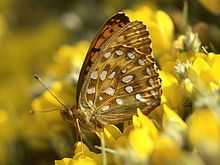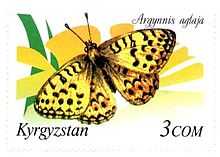Dark green fritillary
| Dark green fritillary | |
|---|---|
 | |
| Scientific classification | |
| Kingdom: | Animalia |
| Phylum: | Arthropoda |
| Class: | Insecta |
| Order: | Lepidoptera |
| Family: | Nymphalidae |
| Genus: | Argynnis |
| Species: | A. aglaja |
| Binomial name | |
| Argynnis aglaja (Linnaeus, 1758) | |
Dorsal view

Postal stamp of Kyrgyzstan
| Wikimedia Commons has media related to dark green fritillary. |
The dark green fritillary (Argynnis aglaja) is a butterfly of the family Nymphalidae. The insect has a wide range in the Palearctic ecozone - Europe, Morocco, Iran, Siberia, Central Asia, China, Korea and Japan.
Subspecies
- A. a. aglaja Southern Europe, Central Europe, Caucasus, Altai, Sayan, West Siberia, South Siberia
- A. a. borealis (Strand, 1901) Europe, Siberia, Russian Far East, Kamchatka
- A. a. lyauteyi (Oberthür, 1920) Morocco (Middle Atlas)
- A. a. excelsior (Rothschild, 1933) Morocco (Rif Mountains)
- A. a. ottomana (Röber, 1896) Armenia, Talys, Kopet Dagh
- A. a. gigasvitatha (Verity, 1935) Tian-Shan, Ghissar, Darvaz, Alai, South Altai
- A. a. vitatha (Moore, 1874) Pamirs
- A. a. clavimacula (Matsumura, 1929) South Ussuri
- A. a. kenteana (Stichel, 1901) Transbaikalia, North Ussuri, Amur
- A. a. tonnai (Matsumura, 1928) Sakhalin
- A. a. bessa (Fruhstorfer, 1907) ?
United Kingdom
In the U.K. the habitat is often pastures and flowery banks, and nearby areas where the preferred foodplants for the larvae, Viola canina and Viola riviniana, grow.
The dark green fritillary uses violets within bracken mosaics frequently consisting of one-third bracken and two-thirds grass, often on the edges of suitable high brown fritillary habitat. Their distribution can be found on the NBN website.here
References
- Emmet, A.M., J. Heath et al. (Ed.), 1990. The Butterflies of Great Britain and Ireland. The Moths and Butterflies of Great Britain and Ireland Vol. 7 Part 1 (Hesperiidae to Nymphalidae). Harley Books, Colechester, UK. 370p.
- Tomlinson, D. and R. Still, 2002. Britain's Butterflies. WildGuides, Old Basing, UK. 192p.
- Bracken for Butterflies Leaflet by Butterfly Conservation